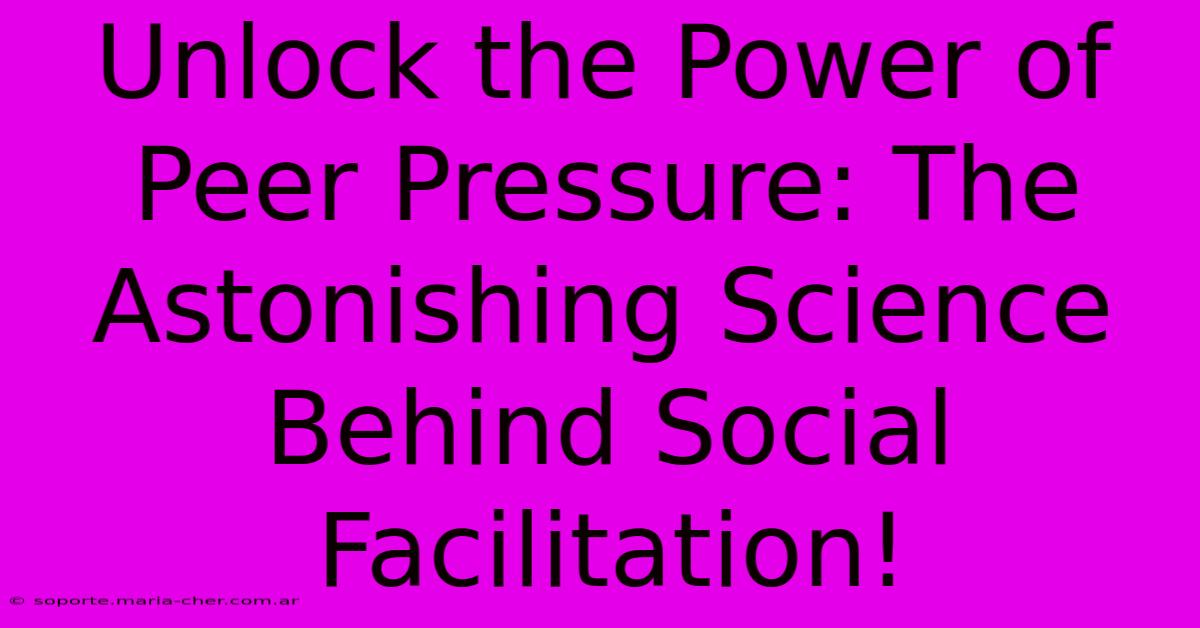Unlock The Power Of Peer Pressure: The Astonishing Science Behind Social Facilitation!

Table of Contents
Unlock the Power of Peer Pressure: The Astonishing Science Behind Social Facilitation!
Peer pressure. The phrase often conjures negative images: risky behavior, conformity, and a loss of individuality. But the truth is far more nuanced. The impact of others on our behavior, a phenomenon known as social facilitation, is a powerful force with both positive and negative implications, deeply rooted in the science of human psychology. This article delves into the astonishing science behind social facilitation, exploring how the presence of others can dramatically affect our performance and choices.
Understanding Social Facilitation: More Than Just Peer Pressure
Social facilitation isn't simply about succumbing to peer pressure; it's a broader concept encompassing how the mere presence of others influences our actions. This influence can manifest in various ways, boosting our performance in some situations and hindering it in others. The key lies in the nature of the task at hand.
The Zajonc Solution: Arousal and Dominant Responses
Social psychologist Robert Zajonc offered a compelling explanation: the presence of others increases physiological arousal. This heightened arousal makes us more likely to perform our dominant response – the most readily available or habitual reaction in a given situation.
If the task is simple or well-learned (like riding a bike), the dominant response is usually correct, leading to improved performance. Think of a seasoned athlete performing better in front of a cheering crowd. The arousal enhances their already-mastered skills.
However, if the task is complex or novel (like giving a public speech for the first time), the dominant response might be incorrect, resulting in impaired performance. The increased arousal triggers mistakes and anxiety, hindering the ability to execute the task effectively. This explains why stage fright is a real phenomenon.
The Role of Evaluation Apprehension
Beyond mere presence, the fear of being judged by others significantly contributes to social facilitation effects. This is called evaluation apprehension. The anticipation of judgment can heighten arousal even more, amplifying both positive and negative outcomes depending on the task's difficulty.
Imagine playing a video game you've mastered: the presence of friends watching might boost your performance as you strive to impress them. Conversely, attempting a difficult new task with an audience might lead to increased anxiety and errors due to the pressure to perform flawlessly.
Harnessing the Power of Positive Social Facilitation
Understanding social facilitation allows us to harness its positive aspects. We can strategically utilize the presence of others to improve performance:
- Practice with a group: For simple tasks, practicing with others can create a motivating and supportive environment, improving learning and skill development.
- Teamwork: Collaborative tasks benefit from the energy and ideas generated within a group setting.
- Competitive environments: Healthy competition, driven by the presence of others, can push individuals to exceed their limits and achieve peak performance.
Mitigating Negative Effects of Social Facilitation
Conversely, awareness of negative social facilitation effects allows for proactive strategies to minimize its drawbacks:
- Preparation: Thorough practice and preparation for challenging tasks can reduce anxiety and improve performance under pressure.
- Supportive environment: Creating a supportive and encouraging environment can lessen evaluation apprehension.
- Gradual exposure: Gradually introducing individuals to challenging situations with audiences can help desensitize them to performance anxiety.
Conclusion: Navigating the Social Landscape
Social facilitation, the influence of others on our behavior, is a complex but fascinating area of psychology. It's not simply about "peer pressure" but about understanding how the presence of others affects our arousal levels and influences our performance. By understanding the underlying principles, we can harness the positive effects of social facilitation to enhance our performance while mitigating the potential negative impacts. Learning to navigate this social landscape is key to unlocking our full potential.

Thank you for visiting our website wich cover about Unlock The Power Of Peer Pressure: The Astonishing Science Behind Social Facilitation!. We hope the information provided has been useful to you. Feel free to contact us if you have any questions or need further assistance. See you next time and dont miss to bookmark.
Featured Posts
-
Maximize Your Childs Potential The Game Changing After School Activities Every Parent Should Know About
Feb 06, 2025
-
Despite Earnings Uber Stock Declines
Feb 06, 2025
-
Rockets Acquire Springer Celtics Pick
Feb 06, 2025
-
Unveiling The Path To Global Impact Dive Into Compassion Internationals Job Opportunities
Feb 06, 2025
-
Bourbon And Beyond 2025 Performers Announced
Feb 06, 2025
